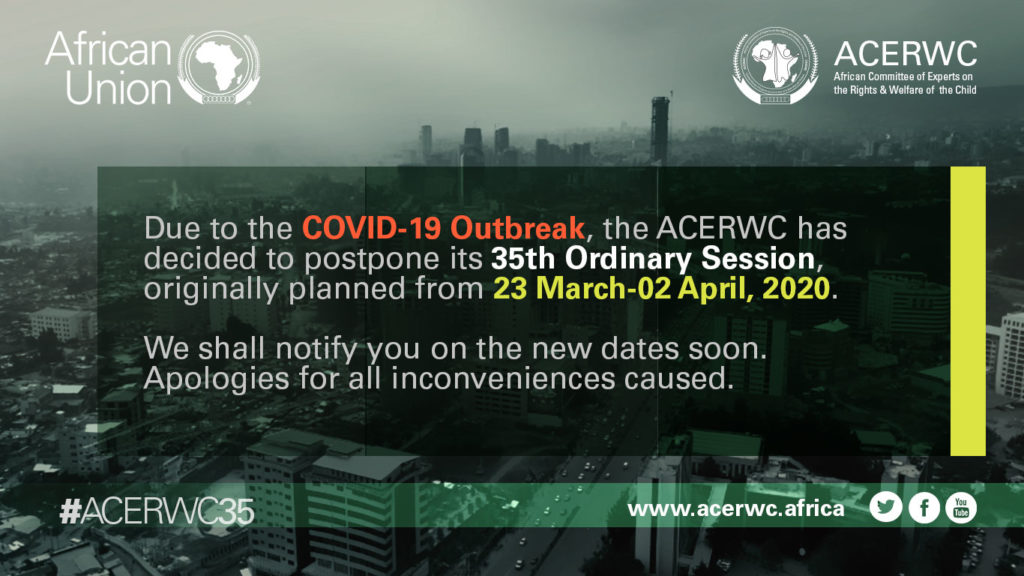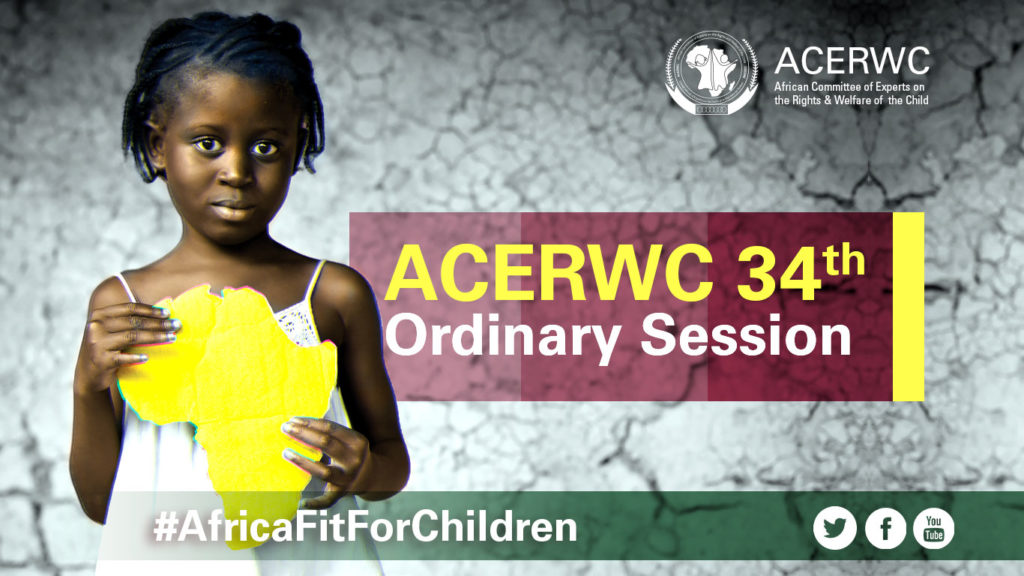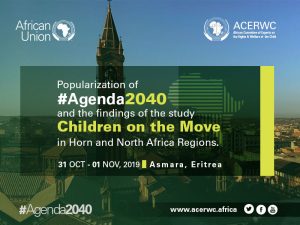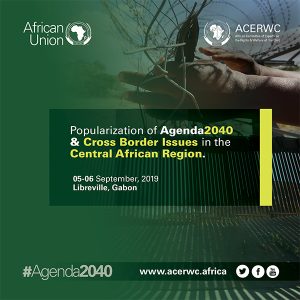
African Committee of Experts on the Rights and Welfare of the Child (Child Committee – ACERCW)


What is the Child Committee?
Established in 2002 by the African Charter on the Rights and Welfare of the Child, the ACERCW is the only region focused child rights instrument in the world. According to Article 42 of the Charter, the functions of the Child Committee are to promote and protect the rights and welfare of the child; to monitor the implementation and ensure the protection of the rights; and to interpret the provisions of the Charter. The African Committee of Experts on the Rights and Welfare of the Child (ACERWC) is also charged with protecting human rights in Africa and interpreting the African Charter on the Rights and Welfare of the Child (ACRWC).
The Committee is based in Addis Ababa, Ethiopia, where it generally holds its biannual ordinary sessions. It is made up of 11 individuals elected by the Assembly of the African Union to serve for one term of five years. States Parties to the ACRWC: Out of the African Union’s 55 Member States, 48 have ratified the African Charter on the Rights and Welfare of the Child. Those 48 States are: Algeria, Angola, Benin, Botswana, Burkina Faso, Burundi, Cameroon, Cape Verde, Chad, Central African Republic, Comoros, Congo, Cote d’Ivoire, Djibouti, Egypt, Equatorial Guinea, Eritrea, Ethiopia, Gabon, Gambia, Ghana, Guinea, Guinea-Bissau, Kenya, Lesotho, Liberia, Libya, Madagascar, Mali, Malawi, Mozambique, Mauritania, Mauritius, Namibia, Nigeria, Niger, Rwanda, Senegal, Seychelles, Sierra Leone, South Africa, Sudan, Swaziland, Tanzania, Togo, Uganda, Zambia, and Zimbabwe. The Committee reports to the Assembly of Heads of State and the African Union (AU) every two years. It must also consider any communications it has received about violations of children’s rights under Article 44 of the Charter to the AU.
The Child Committee has also themandate (Article 43) to receive State Party reports. Up to date 29 States Parties have submittedtheir reports to the Committee. As a quasi-judicial organ, the Committee is also mandated toreceive communications from individuals, groups or (civil society organisations) CSOsaccredited with the AU, the United Nations (UN) or a Member State or have standing beforethe African Committee (Article 44). The Child Committee to date has received three Communications. Moreover, the Child Committee assesses specific country situations andregional/continental problems. In December 2014 the Child Committee obtained an advisoryopinion from the Court which states that it is “highly advisable” that the Child Committeesend cases to the Court, but for that an amendment to the Court Protocol is needed.
The Committee’s Activities:
• Issue “general comments,” guidance and interpretation regarding the ACRWC
• Monitor the ACRWC’s implementation
• Review reports by States and civil society organizations concerning States parties’ implementation of the ACRWC and issue recommendations (“concluding observations”)
• Review “communications,” complaints that allege violations of the ACRWC by States parties
• Conduct fact-finding and promotional missions concerning systematic violations of child rights in States parties
• Establish standards and guidelines to guide States parties in fulfilling their obligations
Basic Instruments
The following is a list of core instruments relevant to the ACERWC’s work, not including other continental human rights agreements, guidelines, and interpretations:
• African Charter on the Rights and Welfare of the Child (text)
• Revised Rules of Procedure
• Strategic Plan 2015-2019
What is the African Charter on the Rights and Welfare of the Child?
The African Charter on the Rights and Welfare of the Child spells out the rights that African States must ensure for children living in their jurisdiction. It is the main instrument of the African human rights system for promoting and protecting child rights.
The Charter, which was adopted by the Organisation of African Unity (now the African Union) in July 1990, entered into force in November 1999. The Charter was the first regional treaty to address child rights.The Charter is divided into two parts of four chapters. Part one deals with the rights, freedoms and duties of the child and has 31 articles. Part two deals with States’ obligations to adopt legislative and other measures to implement the provisions of the Charter, and has 18 articles.
The African Charter was created partly to complement the UN Convention on the Rights of the Child (CRC), but also because African countries were under-represented in the drafting process of the CRC, and many felt another treaty was needed to address the specific realities of children in Africa.
What is the difference between the UN Convention on the Rights of the Child and the African Charter on the Rights and Welfare of the Child?
The two treaties make many similar provisions and have the same over-arching principles of non-discrimination, participation, the best interests of the child, and survival and development.
Some of the other issues that African States wanted the Charter to include were: children living under apartheid, harmful practices against girls (such as female genital mutilation – FGM), internal conflicts and displacement, the definition of a child, the rights of children of imprisoned mothers, poor and unsanitary living conditions, the African conception of communities’ responsibilities and duties, weak enforcement and monitoring mechanisms, the role of the family in adoption and fostering, and the duties and responsibilities of the child towards the family and community.
What does the Committee do?
The role of the African Committee of Experts on the Rights and Welfare of the Child is to promote and protect the rights spelled out in the African Charter of the Rights and Welfare of the Child.
Its main functions are to:
• Collect information
• Interpret provisions of the Charter; monitor the implementation of the Charter
• Give recommendations to governments for working with children’s rights organisations
• Consider individual complaints about violations of children’s rights
• Investigate measures adopted by States to implement the Charter by carrying out missions, collecting information, and questioning States (see Article 45 of the Charter); and,
• Choose the theme of the Day of the African Child, which is held every year on 16 June to commemorate those killed in the Soweto uprisings in South Africa. See CRIN’s information sheet on previous Days of the African Child
Although the Committee cannot bring cases to the African Court on Human and Peoples’ rights, it can request advisory opinions from the Court on legal issues relating to human rights instruments.
When does the Committee meet?
The Committee meets twice a year in ordinary sessions of no more than two weeks. It held its first session in July 2001. The chairperson can also convene extraordinary sessions at the request of the Committee or of a State Party to the Charter.
Sessions generally take place at the Headquarters of the African Union in Addis Ababa, Ethiopia, but can be held elsewhere at the Committee’s request.
Who are the experts?
The Committee is formed of 11 experts who serve in an individual capacity and are elected for a term of five years by the Executive Council. They are appointed by the Assembly of Heads of States and Government of the African Union. In contrast to the African Commission on Human and People’s Rights, Committee Experts may not be re-elected. See the list of current Committee experts.
A fact sheet on the election process to the ACERWC has been compiled by AU Watch to inform civil society organizations about the nomination process, flesh out specific criteria for potential members, and inspire civil society participation.
Although CSOs cannot nominate candidates, they can influence the selection process by:
• Identifying qualified candidates and lobbying them to serve on the Committee.
• Seeking support for the proposed candidates from government officials working on children’s issues or within the Ministry, responsible for monitoring the implementation of the African Charter on the Rights and Welfare of the Child.
• Sending a letter to the Ministry of Foreign Affairs with clear, convincing arguments as to why this person would be a good candidate.
• Lobbying the government to ensure the nomination process is truly transparent and that State Parties select candidates on merit rather than for political considerations.
• Lobbying the government to nominate competent and credible candidates.
The process of selecting candidates will vary from State to State. Members are elected by the Executive Council (comprised of the foreign ministers of AU Member States), by secret ballot in a meeting held prior to the AU Summit. Their decision is then passed to the AU Assembly for final approval and adoption.
What types of investigations can the Committee undertake?
The Committee is empowered to undertake two types of investigations under Article 45 of the Charter:
1. On issues arising from the Charter based on allegations of violations of child rights.
2. On measures taken by States Parties to implement the Charter.
Who would carry out the investigations?
The Committee could set up sub-committees or working groups to carry out the investigation. The Committee can designate a Special Rapporteur among its members or independent experts to accompany sub-committees, working groups and Special Rapporteurs on their missions.
The Committee will prepare a preliminary mission report on the situation of child rights in the country, and a final report in which it will make recommendations to the State party concerned. The recommendations will also be sent to other public and private institutions responsible for monitoring and implementing child rights.
Will these investigations be followed up?
The Committee invites a State to submit a written reply, with information on measures taken to follow up recommendations made by the Committee after the mission. It could request additional information on measures taken by the State party from other institutions and civil society organizations. It could also ask the State to include information about measures it has taken to follow-up recommendations in its next report to the Committee.
How does the State reporting process work?
States should submit their initial reports about the measures they have adopted to implement the provisions of the African Charter, two years after they have ratified the Charter, and every three years thereafter. The Committee began examining State Party reports in May 2008. Rapporteurs are appointed to examine each country’s report. Visit the AU website for access to State reports and Committee recommendations.
How can civil society organizations participate?
The Civil Society Forum on the Rights and Welfare of the Child, which is now held prior to every session of the African Committee on the Rights and Welfare of the Child, supports the work of the African Committee on the Rights and Welfare of the Child and provides a strong platform for children’s rights information and advocacy in the region. Read more about the Civil Society Forum’s work.
Does the Committee examine individual complaints?
Article 44 of the Charter empowers the Committee to consider individual communications alleging a violation of any of the rights enshrined in the Charter. However, States can make reservations on the extent of the Committee’s powers.
The Committee’s guidelines state that “where a child is capable of expressing his or her opinions, they should be heard by a Committee member.” Children may bring complaints under universal human rights treaties if their State is not a party to the African Charter. However, a communication may be presented on behalf of a victim without his consent if the author is able to prove that the complaint has been brought in the supreme interest of the child.Communications are sent to all Committee members three months prior to each ordinary session.
The Committee may set up a working group to meet before its sessions to consider whether a communication will be accepted. The working group then appoints a rapporteur. The Committee, working group or rapporteur brings the communication to the attention of the State concerned and requests an explanation or written statement within six months. The Committee may also request the presence of the person or group submitting the communication, and the State party concerned for more information, clarification or observations.
Provisional measures – possible complaints outcome
While the Committee is considering a communication, it can ask the State concerned to take certain measures to prevent any harm to the child mentioned in the communication, or other children who could be victims of similar violations.No such requests for provisional measures have yet been made, but examples of provisional measures requested in by other regional human rights mechanisms can be found on the Inter-American Commission and the Council of Europe pages.
How does the Committee deal with particular issues of concern?
The African Committee currently has one child-specific special mechanism. The Special rapporteur on child marriage is empowered to monitor this issue in the region, and conduct fact-finding missions on alleged violations. Complaints involving other breaches of children’s rights may be addressed to the African Commission’s special mechanisms.
The future of the Child Committee
Once the Protocol on the Statute of the African Court of Justice and Human Rights comes into force, the Child Committee will be eligible to submit cases to this new unified Court. Moreover, Article 36 introduces new concepts with regard to representation of parties before the Court. It provides that:“The African Commission, the African Committee of Experts […] shall be represented by any person they choose for that purpose.”
Useful contacts and links:
African Committee on the Rights and Welfare of the Child
Commission of the African Union, African Union Headquarters
P.O. Box 3243, Roosvelt Street (Old Airport Area), W21K19, Addis Ababa, Ethiopia
Tel: (251) 1 51 35 22 | Fax: (251) 1 53 57 16
Email: [email protected]
Website: www.africa-union.org
African Commission on Human and People’s Rights
Kairaba Avenue, P.O. Box 673, Banjul, The Gambia
Tel: (220) 4392 962 | Fax: (220) 4390 764
Email [email protected]
Website: www.achpr.org
African Network for the Prevention and Protection against Child Abuse and Neglect
Komo Lane, Off Wood Avenue, P.O. Box 1768, 00200, City Square, Kenya
Tel: (254) 020 3873990 / 3876502 / 3861086 | Fax: (254) 020 3876502
Email: [email protected]
Website: www.anppcan.org
African Child Policy Forum
P.O. Box 1179, Addis Ababa, Ethiopia
Tel: (251) 11 6628192 / 96 / 97 / 99 | Fax: (251) 011 6628200
Email: [email protected]
Website: www.africanchildforum.org
The Institute for Human Rights and Development in Africa
Brusubi Layout 949, Coastal Highway, P.O. Box 1896, Banjul, The Gambia
Tel: (220) 996 22 80 / 775 12 00 / 775 12 01 | Fax: (220) 449 41 78
Email: [email protected]
Website: www.africaninstitute.org
Agenda 2040
Aspiration 1: The African Children’s Charter, as supervised by the African Children’s Committee, provides an effective continental framework for advancing children’s rights
Aspiration 2: An effective child-friendly national legislative, policy and institutional framework is in place in all Member States
Aspiration 3: Every child’s birth and other vital statistics are registered
Aspiration 4: Every child survives and has a healthy childhood
Aspiration 5: Every child grows up well-nourished and with access to the basic necessities of life
Aspiration 6: Every child benefits fully from quality education
Aspiration 7: Every child is protected against violence, exploitation, neglect and abuse
Aspiration 8: Children benefit from a child-sensitive criminal system
Aspiration 9: Every child is free from the impact of armed conflicts and other disasters or emergency situations
Aspiration 10: African children’s views matter
The African Committee of Experts on the Rights and Welfare of the Child (ACERWC), during its recently concluded 28th Ordinary Session in Banjul-The Gambia, has adopted AGENDA 2040, Africa’s Agenda for children: Fostering an Africa Fit for Children.
The Africa’s Agenda for Children 2040 emanates from the conclusions of the High Level Conference to assess the status of the rights of children in Africa 25 years after the adoption of the Charter, that was held in Addis Ababa, from 20-21 November 2015, as part of the Commemoration activities of the 25th Anniversary of the African Charter on the Rights and Welfare of the Child. During the Conference challenges and successes of the endeavors employed to promote and protect the rights of the child in Africa were assessed with a view of guiding the future efforts to promote and protect the rights and welfare of children in Africa.
Aligned with the African Union Agenda 2063, the Africa’s Agenda for Children is in line with Aspiration 6 of Agenda 2063: An Africa whose development is people-driven, relying on the potential of African people, especially its women and youth, and caring for children; and therefore focuses on children and youth as the drivers of Africa’s Renaissance. The document is also informed by AU legal and policy frameworks.
The Agenda sets out ten aspirations, to be achieved by 2040, in five implementation phases that are 2020, 2025, 2030, 2035 and 2040. State Parties are expected to align their national implementation plan with their commitments and obligations under Agenda 2063, the Sustainable Developments Goals and other international treaties.
Read the above ten aspirations.
Sessions


Events
WORKSHOP ON THE POPULARIZATION OF AGENDA 2040 AND FINDINGS OF THE STUDY ON CHILDREN ON THE MOVE

Workshop on the popularization of Agenda 2040 and findings of the study on Children on the move by the African Committee of Experts on the Rights and Welfare of the Child in Horn and North Africa regions, 31 October-01 November, Asmara, Eritrea.
Popularization of Agenda 2040 and Cross Boarder Issues in the Central African Region.

The committee organizes an extension workshop of the #agenda2040and recommendations of the mapping study on children in movement situation in the #central Africa region of 05-06 September 2019 in Libreville, Gabon. #Eccas. #Childrenonthemove